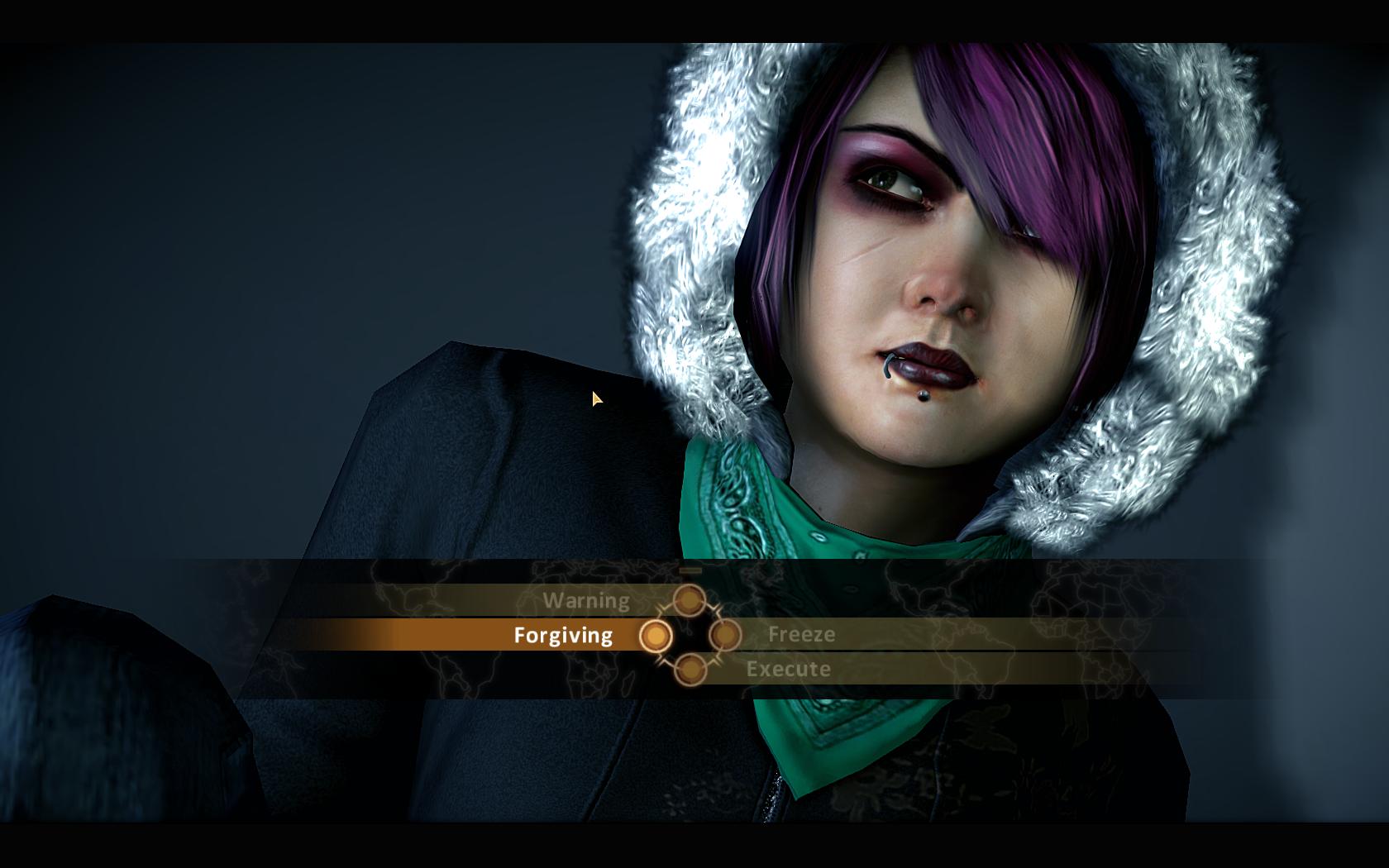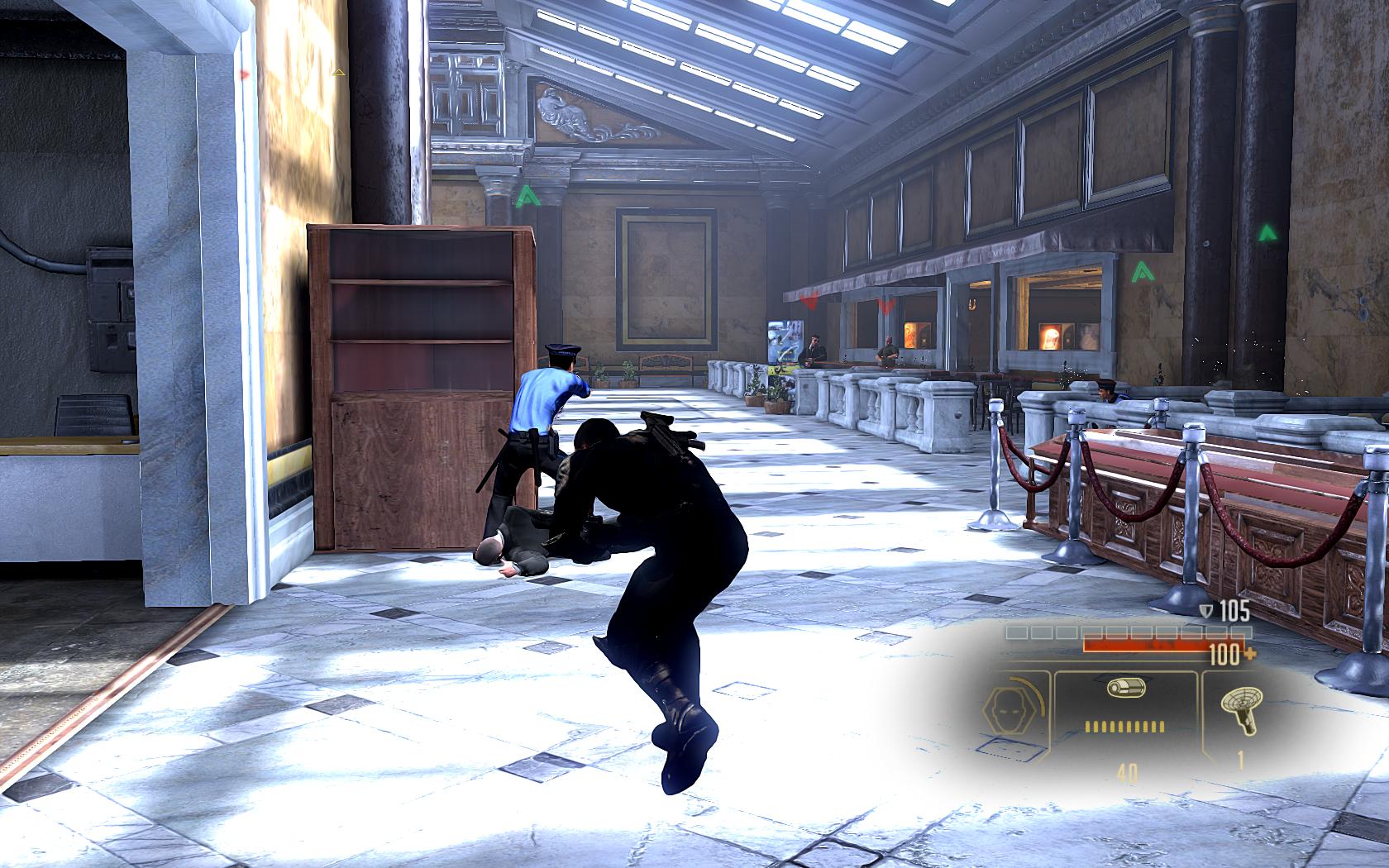The power of choice – it seems like that’s been one of the biggest selling points for really any game these days. Choices in how you can kill a guy, choices you in how you can go about a level. Those are easy, but what about choices that shift a narrative, change up relationship dynamics between NPCs and affect the world around you in a tangible, convincing way? Harder. Whatever it may be, may it be time constraints, the increased costs of developing a video game, or whatever, when a developer promises choices and consequences these days, they rarely ever consist of nothing more than either a “Hey, this is slightly different now.” or a slap on the wrist for choosing the ass-jock dialogue option.
This is where Alpha Protocol is different and where Obsidian absolutely succeeds in.
For a game that generally looks like crap, manages to squeak by with gameplay systems that function just enough to be playable, it’s a game that’s incredibly reactive, devoted to making you feel like the choices you make in and out of conversations make a tangible difference in the world of espionage you’re involved, because in reality, you really are and this is why Alpha Protocol is highly recommended. There’s the just that one caveat of the game kind of sucking sometimes, but persevere. It’s a diamond in the rough, with about a miles worth of earth and sediment tossed on top of it.
Set in the somewhere in the year of… somewhere today, you play as Michael Thorton. Thrown into the off-the-record government agency Alpha Protocol, you’re tasked with figuring out who got a hold of some the serious tech that blew up a passenger aircraft in the Middle East.
Sounds mildly interesting, but the game gets off on the wrong foot. A messy, boring tutorial takes you through the basics through a linear set of rooms, making for something that doesn’t seem like it’ll wind up being a fun game if keep on pressing forward. Granted, all of this is kind of necessary, but to go about like it does makes for a weak first impression.
Press on, however and you’ll be rewarded with a game that figures itself out soon enough. Story elements start pushing forward and soon enough, you’re on the run with only one contact within Alpha Protocol who is willing to help you out. The game breaks itself into several hubs soon after, with missions taking place in Rome, Moscow and Taipei. While each hub has their own self-contained storyline, the factions and character relationships have the potential to cross paths frequently, making for an interesting dynamic.
And this will or will not occur depending on your decisions. Obsidian’s dialogue system works with the obvious idea that a conversation naturally always presses forward. Dialogue has flow and part of this is because of the game’s dialogue system; simple adjectives or verbs signify intent and choosing a response will have Thorton expand that into a sentence. The difference between Alpha Protocol’s dialogue system and Mass Effect’s is that you can never circle back to a topic and the responses you choose frequently affect the disposition of a character towards you, and what they think of you matters. A lot.
It’s what winds up making Alpha Protocol the kind of the not-good-but-totally-awesome-in-one-thing-it-does game it is. Characters are extremely well-written and well-acted, almost always teetering into camp territory, but never truly crosses over, maintaining a pretty serious mood throughout the game. The game still manages to find spaces to inject the game with lots of humor and as a development studio, writing is most definitely one of Obsidian’s greatest strengths. If a game doesn’t have Steven Heck in it, then that’s one thing Alpha Protocol will always have the upperhand in.
Besides the characters in the game naturally being fun to talk to, what you say and what you do affects the game in ways that are really refreshing. You bet if you get on G22s good side they’ll send help your way. Piss of Surkov and chances are you’ve lost a thread of information and intel, but in turn, a different set of potential outcomes come your way. In the short term, you can see the impact of your choices immediately felt; in the long term, stuff you might have forgotten about suddenly become an issue or affect you in a positive way. Losing influence with factions and characters isn’t inherently a bad thing either, because that comes with its own set of branching paths that beg to be explored.
Alpha Protocol pulls this off so consistently that all its issues can almost be forgiven. Just like the amount of flexibility you have in dialogue sequences, the game gives you two major options when tackling missions – shooting or stealth. Alpha Protocol is a bad shooter if you perceive as your usual cover-based material. It’s clear Obsidian had a different agenda with just how you’d shoot. It’s all about training your sights on a target and going for the critical strike. It sounds great in theory, but it’s immensely dumb in practice. Imagine taking cover, popping out and waiting for your sights to slowly come into focus onto a target. The AI’s been firing at you for 5 seconds, you pull the trigger and down he goes. This aim-wait-pop is a big aspect of Alpha Protocol’s shooting and it’s just really strange.
Stealth fares better. It’s relatively straightforward. Crouch, sneak around, find holes in patrols and remain unseen. It works well enough and the level design accommodates taking the stealthy route. The issues arise in Obsidian screwing up a few basic rules of stealth. For one, guards barely have any layered responses; the second they catch any piece of you in their line of sight, alarms will sound, guns will go off and you’re compromised. The lack of any indication of how well you’re hidden presents another problem, making the stealth in Alpha Protocol much more trial-and-error than it should be.
How much more proficient you can be in your major disciplines comes down to how you spend your AP points. It works a lot like Mass Effect’s system in how you toss points into a set of major skills, constantly upgrading them. The difference is how each new rank grants you a new ability or an upgrade to a previous ability. While an exciting prospect, it’s hard to tell if your base skill increases in the rank you just invested in, if at all. Now the chain shot lets me target five at a time, but did my accuracy and damage output increase? Maybe…?
The list of problems, big and small, kind of keeps going. Alpha Protocol look unimpressive; animations are largely bad, textures lack definition and the geometry in the all the environment sports some really uninspired looks. Character models look better, with relatively spot-on lip-synching and a handful of canned animations they cycle through. They’re also the highlight in the game’s audio, with quality voice-acting all-around. The voice acting goes a long way in establishing how the characters in Alpha Protocol go about in presenting themselves.
At the end of Thorton’s 15-hour-or-so espionage fun time, it’s hard to not really like Alpha Protocol just because of the few things it did so right. If the gameplay systems were better and well-conceived, then this would’ve been a much better game. Instead, it’s a more memorable game because of the faults it carries with it. Both a good or bad thing, but one thing’s for sure – Alpha Protocol is a game that should be played more than once.